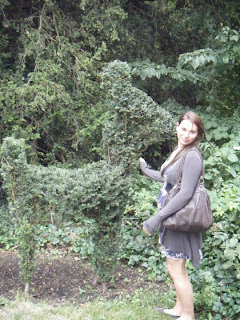Friday 25 November 2011
Did Coriolanus play league?
Wednesday 2 November 2011
Gendered language
Tuesday 1 November 2011
An almost entirely unrelated post
The grammatically abhorrent question mark in Playmobil's Fi?ures set is the clue that these toys are sold in blind packs.'Grammatically abhorrent' eh? Appropriate for the morning after Halloween: beware of those horrifying question marks. The world seems to be dividing into those who stress about grammar ('the Grammar Snob') and those who don't know and don't care ('everyone else'). I was particularly amused to get an email this week from someone who had ranted to me on a number of occasions about the use of apostrophes by others, and referred to "Julian Barne's new book". Oops. Let he who is without sin, etc.
Friday 16 September 2011
The raven himself is a horse
Of course even without modularisation there is no reason why students can't be entered early for the whole qualification - it's been customary in some places for years to enter some students for the whole of their English GCSE in November, which is a re-sit session: the reasoning goes that the overall standard of the candidature is lower, because it consists mostly of those who failed, so candidates who are expected to pass will look better by comparison. Also, as with A level marking in January sessions, it is often thought that the marking is better - because only 'good' markers (and there's a whole can of worms you can read about in my DPhil thesis if you must) are asked to return for those sessions which require many fewer markers, because there are many fewer candidates. It used to be official advice from AQA that candidates for the Editorial Writing module of A2 English Language should be entered early, so they could use the January exam as a 'mock' for the summer (and let's not get into the matter of exam fees on that one, eh?).
So does it demoralise and demolish fragile self-confidence? Is that a necessary evil for those getting through it with better marks, or getting a qualification at all? Have you taken any modules or qualifications at a different time than usual? How did it feel?
Thursday 28 July 2011
Literary Endeavours
Thursday 21 July 2011
A bloat of hippopotamuses
Wednesday 29 June 2011
Like, really interesting.
Saturday 18 June 2011
Friends, Romans, Countrymen, lend me your words
The future is now...
Well this is an exciting but not entirely English related post. I'm creating it on my mobile phone. It's going to take a while, given the one-fingered typing it requires.
I'm not the first to do this, and in fact Neil Gaiman has been doing it for years. And more and more people are using their phone as one of their main ways to use the internet, let alone to read e-books. Surely all this mobile reading and writing is going to have an effect? Internet writings are going to get shorter, and people's attention spans will shrink with them? It's alleged that one of the effects of the National Literacy Strategy, with its snippets-based approach to literature, created a generation of children who couldn't manage an entire book, because as far as they were concerned, English came in units of a couple of paragraphs.
I don't know. What I do know is that kids reading and writing what they want to read and write is a Good Thing (see earlier post on texting). In a recent job interview I was asked what the potential use of mobile devices in the classroom was: they have enormous potential for a school and teacher brave enough to swim against the tide of public opinion, and with students sensible enough not to abuse the privilege. Instant internet facts, or YouTube clips of poets reading, or photos for animations or recording of presentations, or even mobile blogging. The possibilities will surely increase and increase; this little palm-sized thing I'm writing on is exponentially more powerful than that first school BBC acorn computer I learnt to type on twenty years ago.
Meanwhile I must get back to the present and marking my final 50 KS2 reading scripts. I wonder if I could upload the marks using my phone...
Wednesday 4 May 2011
Dane-jà vu
Sunday 24 April 2011
Promised Poetry
Saturday 23 April 2011
Useful link
Saturday 9 April 2011
Oh just give her a slap and get over it
There's only one problem. I hate Wuthering Heights. With a passion. Probably a passion only matched by Heathcliff and Cathy's self-obsessed, self-regarding, entirely selfish and completely destructive passion for each other. And if writing about it the first time was hard enough, the second time it's purgatory.
Friday 8 April 2011
The BBC says it best: LOL's in the OED.
"OMG! LOL's in the OED. LMAO!"
If you find the above string of letters utterly unintelligible, you are clearly an internet "noob". Let me start again.
Sunday 3 April 2011
Hope triumphing over experience
 This is Emily with the yew deer in the garden of the house.
This is Emily with the yew deer in the garden of the house.


